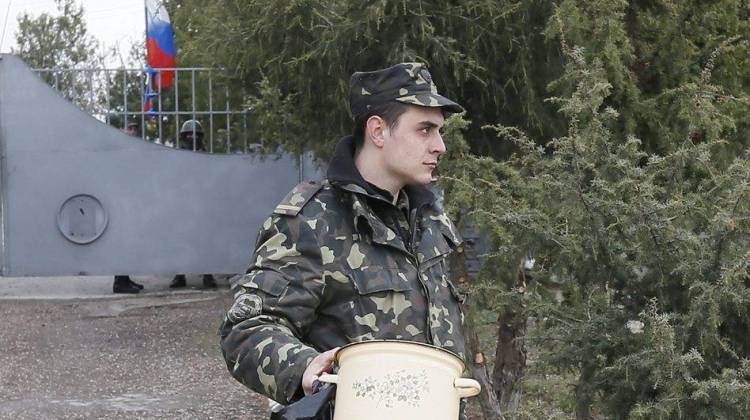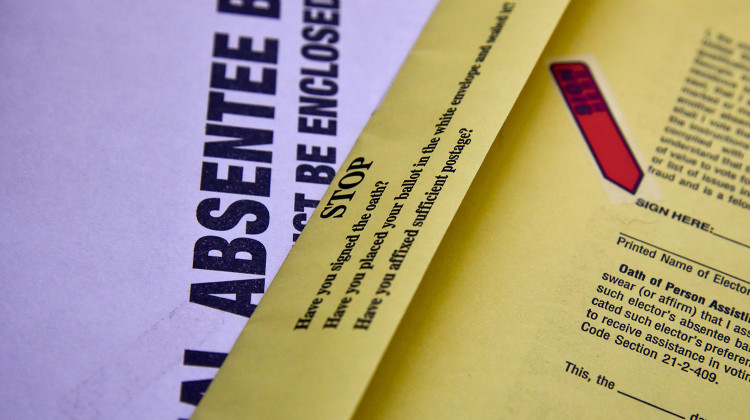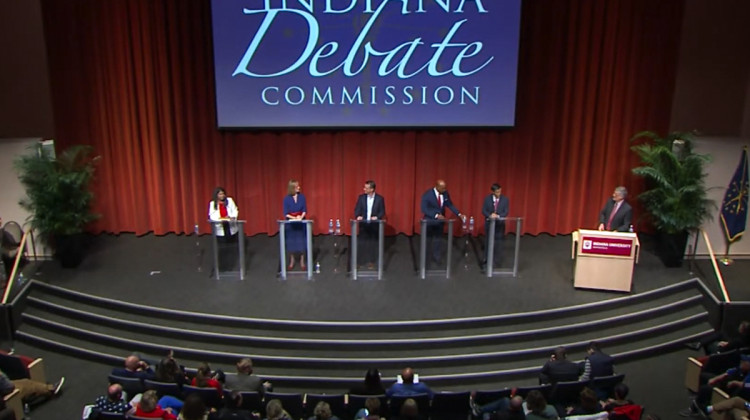Ukraine's plans to withdraw its troops from Crimea, which as we reported were announced Wednesday, have apparently been complicated by the issue of whether they will be allowed to take their weapons and other equipment with them.
NPR's Gregory Warner reports from the Crimean capital of Simferopol that the 25,000 or so Ukrainian troops in the region had not been given orders to leave by their commanders as of midafternoon local time on Thursday. Ukrainian authorities want their troops to bring their weapons, vehicles and other equipment with them. But the Crimean local defense forces and Russian commanders on the ground are reportedly raising objections.
Meanwhile, there's word from The Moscow Times that "a Ukrainian officer, detained after pro-Russian forces stormed a naval base in Crimea, was released Thursday after Russia asked the regional authorities to let him go."
Ukraine, as Bloomberg News reports, "plans to reinforce its eastern border with Russia and withdraw troops from Crimea, ceding control of the Black Sea peninsula as tensions remained high over Russian moves to annex the breakaway region."
Update at 9 a.m. ET. Some Movement?
Reuters reports that "Ukrainian border guards in Crimea, which is under the control of Russia's military, have started redeploying to regions on the mainland, a senior official said on Thursday."
"We have started the gradual redeployment of our servicemen to the territory of Kherson and Mikolayiv regions," Pavlo Shysholin, deputy head of the state border guard service, told a news conference. Reuters adds that "Shysholin also said about 1,000 civilians had so far left the peninsula."
Background
As the crisis in Ukraine has developed over recent weeks, we've tracked developments. Here's a recap:
Crimea has been the focus of attention as the ripple effects of the protests that led to last month's ouster of Ukrainian President Viktor Yanukovych have spread.
Summing up the history and importance of Crimea to Russia and Ukraine isn't possible in just a few sentences, of course. The Parallels blog, though, has published several posts that contain considerable context:
-- Crimea: 3 Things To Know About Ukraine's Latest Hot Spot
-- Crimea: A Gift To Ukraine Becomes A Political Flash Point
-- Why Ukraine Is Such A Big Deal For Russia
Shortly after Yanukovych was deposed and fled Ukraine, Russia moved to take control of Crimea by sending thousands of troops there to secure strategic locations. Along with "local defense forces," those soldiers surrounded Ukrainian military facilities.
This week, after Crimeans voted to join the Russian Federation, Russian President Vladimir Putin signed a treaty to annex the region. The U.S. and European Union have objected, calling that action a violation of international law. Putin says he is supporting Crimeans' right to "self-determination."
We've recapped what set off months of protest in Kiev and ultimately led to Yanukovych's dismissal by his nation's parliament last month this way:
"The protests were sparked in part by the president's rejection of a pending trade treaty with the European Union and his embrace of more aid from Russia. Protesters were also drawn into the streets to demonstrate against government corruption."
It was after Yanukovych left Kiev and headed for the Russian border that troops moved to take control of strategic locations in Crimea.
9(MDEwMDc1MzM3MDEzNDczOTA0MDc1MzViMQ001))
 DONATE
DONATE








 View More Programs
View More Programs

 Support WFYI. We can't do it without you.
Support WFYI. We can't do it without you.